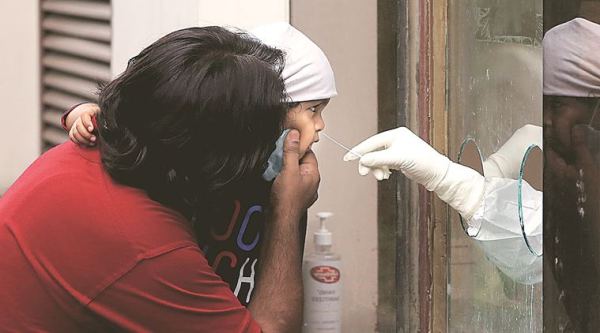 Swab samples being collected for testing. (Express photo: Gajendra Yadav)
Swab samples being collected for testing. (Express photo: Gajendra Yadav)
The All India Institute of Medical Sciences administered the first dose of Bharat Biotech’s Covaxin to a 30-year-old man on Friday, days after it received approval from the ethics committee to start human trials. He will be monitored for two weeks and then given the second dose. The country’s top medical institute is among 12 sites selected by the ICMR to conduct Phase I and II randomised, double-blind and placebo-controlled clinical trials of Covaxin.
“The first dose of 0.5 ml of the intramuscular vaccine was administered to him on Friday. He was kept under observation for two hours. A diary has been handed over to him for continuous monitoring of the conditions. We will also coordinate with him daily for at least a week to understand if he is facing any medical issues,” Dr Sanjay Rai, principal investigator of the Covid-19 vaccine trial at AIIMS, told The Indian Express.
Covaxin, being developed by Hyderabad-based Bharat Biotech in collaboration with ICMR and National Institute of Virology (NIV), recently got the nod for human clinical trials from the Drugs Controller General of India (DCGI).
AIIMS director Dr Randeep Guleria had recently said that once the vaccine is developed, the priority will be high risk groups — the elderly, those with comorbidities, frontline workers, etc. “A vaccine sometimes takes even 10 years to develop because it’s done in different steps. It is an investment in which one step may or may not lead to the next step. But because we need to compress everything in a safe time, we are taking the risk that things will happen and we assume that it will happen. If everything works, then maybe we can say that by the end of the year, we may start manufacturing,” he said.
He had said that the duration for which a vaccine may remain effective will depend on how the virus mutates: “Influenza requires multiple vaccinations because the virus keeps mutating. We have not seen such mutations with Covid-19.”
In Phase I, the vaccine would be tested on 375 volunteers, including 100 at AIIMS. The second phase would include around 750 volunteers across the 12 sites. The medical institute has so far received over 3,500 applications for participation in the human trials.
The institute conducts around 50 tests, including for diabetes, hypertension, kidney and liver diseases, on participants to ensure that they fit for trial. Only those aged between 18 and 55 are eligible. “We have shortlisted 20 volunteers who have undergone several tests to participate in the trial. The results are awaited. Around 60% of the volunteers are female,” said Dr Rai.
Jain holds meet on sero survey strategy
As many as 1,025 fresh cases of Covid-19 were reported from the capital on Friday, taking the tally in the city to 1,28,389. The death toll rose to 3,777, with 32 more fatalities reported.
On Friday, Delhi Health Minister Satyendar Jain convened a meeting with senior health officials to discuss the strategy on serological surveillance, which will be carried out in the first five days of every month starting from August. The comprehensive sero surveillance carried out in Delhi between June 27 and July 10 suggested the prevalence of Covid antibodies in 22.86% of the population
The minister also took a meeting with the state nodal officers and heads of the hospitals to discuss the steps to reduce the mortality rate. At present, Delhi’s fatality rate is 2.94% while the national average is 2.37%.